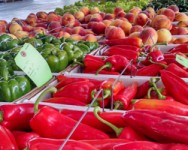Chautauqua Winter Vegetable Meeting - MODIFIED
Event Details
Date
February 10, 2023
Time
8:15 am - 2:45 pm
Location
NEW LOCATION: Andy Raber's Blacksmith Shop
12451 Eldredge Rd
Conewango Valley, NY 14726
Cost
FREE!
Host
Cornell Vegetable ProgramElizabeth Buck
585-406-3419
email Elizabeth Buck

PLEASE NOTE: The location and agenda has been changed for this event.
Meeting will feature growers from Ohio sharing their production know-how and thoughts on food safety. Other topics include weed control, pesticide safety, and the impact of poor crop nutrition. The morning portion of the event will offer 0.75 DEC credits in categories 1a and 23, plus 0.5 in CORE (good for all categories). Trade show booths available.
MODIFIED AGENDA:
8:00 am Doors open. Sign-in, survey completion, browse booths
8:15 am Welcome, announcements
8:30 am How Fertility Relates to Pests and Diseases -- Elizabeth Buck, CCE Cornell Vegetable Program
Recognizing fertility deficiency symptoms and distinguishing them from similar-looking diseases, disease-based causes of poor fertility/water responses in tomatoes, relationship between fertility and insect pressure, esp. around excessive N and increased aphid issues.
8:45 am Making Weed Control Decisions in Veg Crops -- Elizabeth Buck, CCE Cornell Vegetable Program
Interactive session that will have participants practice using herbicide support resources and other weed control references to develop effective integrated weed control programs
9:15 am Eden Valley Growers Updates -- Keith Baskerville, Eden Valley Growers
Updates from the co-op, including their view on why written food safety plans matter.
9:30 am Pesticide Safety for the Family & You -- Mary Centrella, Pesticide Safety Education Program
This presentation will focus on understanding and mitigating the health risks associated with pesticide usage and emphasize safety solutions for small farms.
10:00 am Fertility, Soil Health & Field Crops Topics -- Greenfield Farms Reps
Non-DEC content on soil health, nutrient mgmt., and cultural practices in field crops.
11:30 am Adjourn DEC credit portion of the meeting. Lunch.
12:30 pm Raising Sheep -- Ohio sheep farmer
1:15 pm Why Adopt Food Safety? -- Jonas Yoder, Food Safety Educator
A motivational and informative talk from Jonas Yoder of Mt. Hope, Ohio.
1:50 am Break
1:55 pm Food Safety Resources -- Robert Hadad, CCE Cornell Vegetable Program
Overview of food safety planning and implementation resources and one-on-one advice that are currently available, plus a discussion of what further support would be helpful.
2:10 pm Grower Panel -- David Raber and Ervin Weaver from Mt. Hope, Ohio
Ervin Weaver is a conventional auction grower and David Raber raises organic produce for auction and a farm market. These experienced farmers will share their vegetable growing know-how and then take audience questions.
2:45 pm Adjourn
COST and REGISTRATION:
This event is FREE to attend! Call Elizabeth Buck at 585-406-3419 to pre-register.

Upcoming Events
Orleans Regional Winter Vegetable Meeting
February 9, 2026
Albion, NY
Topics include: Breeding and evaluating tomatoes to control disease and improve yield, jar testing and ensuring spray water quality, breaking down organic matter, FSMA updates and Q&A with Ag & Markets, and industry updates. Includes hands-on learning, coffee break, and sponsor booths.
DEC credits available: 1.0 in CORE plus 0.5 in 1a, 10 or 23
African Eggplant Participatory Breeding Kick-Off
March 5, 2026
Join us to learn about the Cornell African Eggplant Research Project and learn how you can participate! African eggplant, also known as Bitterball, Garden Egg, Kittley and other names, is an important crop for many members of our community with heritage from regions such as sub-Saharan Africa, Southeast Asia, and Brazil. Since 2024, the Cornell African Eggplant Research Project has been collaborating with growers and community partners across New York to develop high-quality varieties adapted to the Northeast U.S. In this meeting, we will share information about growing and preparing African eggplant, highlight our research to date, and invite partners to collaborate with us in our 2026 participatory breeding and variety selection efforts.
COST: FREE! You must pre-register to receive the Zoom link.
Managing the Invasive Swede Midge Webinar
March 6, 2026
Swede midge is an invasive fly that causes serious economic losses to brassica crops. Due to its small size and hidden feeding habits, swede midge is often called an "invisible pest" and damage may be misdiagnosed. In this webinar, we will review the swede midge life cycle and crop damage symptoms, current management recommendations, new research findings, and highlights from on-farm case studies with a focus on organic management.
1.75 DEC pesticide recertification credits in categories 1a, 10, and 23.


































